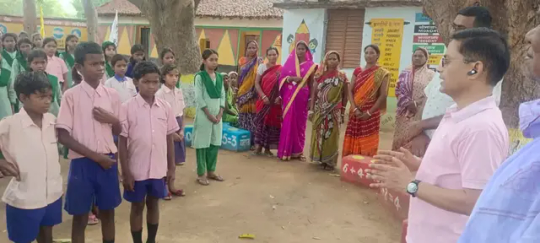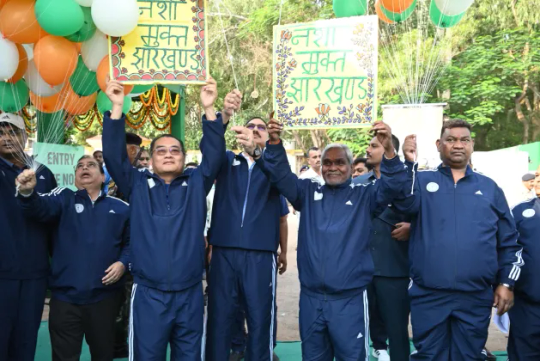#Drug-Free Jharkhand campaign
Explore tagged Tumblr posts
Text
Awareness Workshop on Drug-Free Jharkhand Campaign Held at Tangrain School
Tangrain School hosts special class for Navodaya exam preparation alongside drug-free campaign workshop. A workshop on the Drug-Free Jharkhand campaign was held at Tangrain School, emphasizing societal responsibility. JAMSHEDPUR – An awareness workshop under the Drug-Free Jharkhand campaign was organized at Upgraded Middle School, Tangrain. Addressing the students, school management committee,…

View On WordPress
#Abhay Kumar Dwivedi#शिक्षा#Drug-Free Jharkhand campaign#education#Jamshedpur education news#lightning safety measures#Navodaya exam preparation#Potka Block Development Officer#School Management Committee#social awareness workshop#special class inauguration#Tangrain School event
0 notes
Text
Jharkhand CM Champai Soren Launches Campaign for a Drug-Free State
Awareness Chariots Flagged Off, Strict Action Promised Against Drug Dealers Jharkhand Chief Minister Champai Soren emphasized the need for public participation in making the state drug-addiction free, as he flagged off an awareness chariot for the cause. RANCHI – Speaking at the event, Soren stated, "Strictness will also be taken for this. Strict action will be taken against drug dealers. We all…

View On WordPress
#Awareness Chariot#राज्य#Champai Soren#drug abuse prevention#Drug-Free Jharkhand campaign#ill effects of drugs#Jharkhand drug-free state#officials take oath#public participation#state#statewide campaign#strict action against drug dealers
0 notes
Text
CM Champai Soren Leads Anti-Drug Campaign in Jharkhand
State Government Pledges to Create Drug-Free Society Chief Minister reaffirms commitment to combat narcotics and protect youth at state-level awareness program in Ranchi. RANCHI – Chief Minister Champai Soren attended the "State-level Awareness Program against Narcotics" at Morhabadi ground on Wednesday, June 26, emphasizing the government’s dedication to creating a drug-free Jharkhand. The Chief…

View On WordPress
#anti-narcotics drive Ranchi#मुख्य#Champai Soren anti-drug campaign#drug-free society initiative#Featured#Jharkhand government drug policy#Jharkhand narcotics awareness#Jharkhand police anti-drug operations#Morhabadi ground event#school drug awareness#state-level awareness program#youth protection Jharkhand
0 notes
Text
District-Level NCORD Meeting Focuses on De-Addiction Campaign in West Singhbhum
Officials discuss comprehensive strategies for a drug-free society in West Singhbhum, emphasizing awareness and community involvement. West Singhbhum district officials vow to create a drug-free society through a coordinated de-addiction campaign running until June 26. CHAIBASA – A district-level NCORD (Narco Coordination Centre) meeting convened with the Superintendent in the Collectorate…

View On WordPress
#awareness campaign#राज्य#Community Involvement#de-addiction campaign#Deputy Commissioner#Drug abuse#Drug Free Society#Jharkhand government#NCORD meeting#state#toll-free number 112#West Singhbhum
0 notes